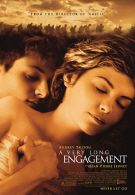A Very Long Engagement lets its characters discover what we already have, yet withholds key points so that their surprise reflects our own. This wondrous film, based on the novel by Sebastien Japrisot, is far from a complete mystery, as it gives the viewer an opportunity to enjoy plot revelations while still being able to guess where it is going.
Every supporting character plays an intricate role in the story and the development of the main character. The story’s central figure, a young French woman named Mathilde (Audrey Tatou), receives word that her fiancé, Manech (Gaspard Ulliel), a young soldier fighting at the end of World War I, has been court-martialed for self-inflicted wounds (what he believed to be his ticket home) and sentenced to death. En route to his execution, he and five other soldiers sentenced for the same crime get lost between the French and German armies. Rather than accept the loss, she embarks on an investigation to discover his fate.
She questions everyone—the friends and relatives of the four other men, soldiers who encountered them, and higher-ranking military officials associated with the court-martial. In the process, she learns several versions of Manech’s supposed last days. Convinced her lover is alive, she pushes ahead. Each supporting character, forming an ensemble, contributes an important revelation; these lessons give her journey meaning.
This is rich, candid storytelling. The opening minutes offer flashbacks of the five men before the war, yet avoid any standard wartime clichés (such as the long goodbye at a smoky train station) and show them in a realistic, humorous light. Sure, most of them had questionable professions before the war (one is a pimp), but they are still good, honest men. A Very Long Engagement gives us a chance to get to know these soldiers and maybe even like them before they enter the war.
Other than the opening minutes, the film’s focus is on how the war affects friends and family. The case is made that there are tortures worse than the horrors on a battlefield, specifically the aftereffects—physical and mental separation soldiers later experience with themselves and loved ones. Mathilde’s discovery of Manech’s fate is unified by these vignette-like stories told by interviewees, each adding a different perspective on the years following the war, while still giving our heroine what she needs to move forward.
Mathilde’s odyssey is reminiscent of this year’s Wicker Park. In it, Josh Harnett’s character goes through hell (Chicago, actually) to uncover why his former love disappeared without a trace, showing the desperate measures people will go through to be reunited. The connection here between Mathilde and Manech is the heart of the film. Their relationship is perfectly realized and touching, defined by a sense of destiny throughout. The film takes its time to show their romance blossoming at a younger age, with a pesky Manech following Mathilde around in their small village, questioning her about her limp (which she developed when she was a child) and following them in the years leading up to the war. We believe they are meant to be together; Mathilde often reminds herself that if Manech were dead, she would know, hence she never gives up.
A Very Long Engagement is easily one of the best films ever made to focus on the effects of war over the battles themselves. If you learn anything from this film, it’s that even though war can keep people apart, it can also bring them together.
Most Popular




